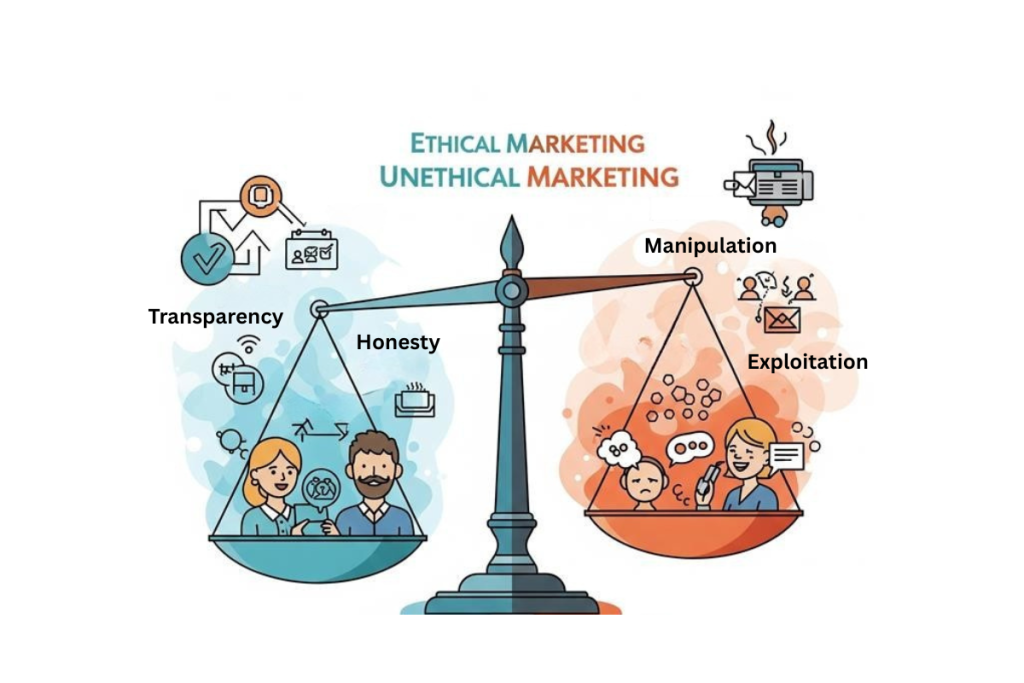Introduction
Marketing has the power to influence minds, shape choices, and build trust or break it. As consumers grow more aware and socially conscious, the ethics behind advertising and brand storytelling have come into sharper focus. But where precisely is the boundary between persuasion and manipulation? This blog explores ethical vs unethical marketing: what’s the real difference? It breaks down how businesses define these concepts today, why they matter (or don’t), and what it means for your brand reputation and bottom line.
What Is Ethical Marketing?
Ethical marketing entails promoting products and services in a way that is truthful, fair, and considerate of customers. It transcends mere legal compliance; it seeks to align business operations with core values.
Key characteristics include:
- Transparency: Clearly articulating the functions of the product and its limitations.
- Consent: Implementing opt-in methods rather than deceptive sign-up practices.
- Inclusivity: Steering clear of stereotypes or damaging imagery.
- Precision: Avoiding incorrect statements or deceptive information.
- Social responsibility: Promoting equitable trade, ecological sustainability, or community welfare.
The objective of ethical marketing is to cultivate enduring trust, even if it results in slower immediate profits. In the discussion of ethical versus unethical marketing: what is the fundamental distinction?, this perspective prioritizes people over profit.
What Is Unethical Marketing?
Unethical marketing prioritizes persuasion above all else, even if it means deceiving, exploiting, or manipulating the audience. Though these strategies might produce quick outcomes, they often diminish trust as time goes on.
Unethical practices encompass:
- False advertising: Making claims about benefits that are nonexistent.
- Fear-based selling: Instilling anxiety to compel a purchase.
- Fake reviews: Purchasing or fabricating customer testimonials.
- Cultural insensitivity: Employing offensive stereotypes or messages.
This aspect of ethical versus unethical marketing: what is the true distinction?prioritizes short-term outcomes over long-term credibility.

Ethical vs Unethical Marketing: What’s the Key Difference?
5 essential factors that distinguish ethical marketing from unethical marketing:
- Clarity vs. Misrepresentation: Ethical marketing delivers straightforward, truthful details about products or services. Unethical marketing typically includes overstatements, concealed conditions, or deceptive assertions.
- Customer-Centric vs. Brand-Centric: Ethical approaches focus on the needs and welfare of the customer. Unethical methods prioritize the brand’s interests and earnings above everything else.
- Trust Development vs. Emotion Manipulation: Ethical marketing cultivates trust by honoring the audience. Unethical marketing exploits emotions, frequently instilling fear, urgency, or unrealistic expectations to drive sales.
- Inclusivity versus Stereotyping: Ethical campaigns celebrate diversity while steering clear of damaging stereotypes.
Does Ethics Matter in Today’s Market?
Absolutely today’s consumers increasingly expect more from brands than ever before. They are knowledgeable, frequently verifying statements and reading evaluations prior to making a buy. They prioritize values, selecting brands that align with their personal convictions. Thanks to the influence of social media, they swiftly expose companies for unethical actions, resulting in backlash that can escalate quickly. Companies that emphasize ethical marketing gain several significant advantages. They gain customer loyalty, create positive word-of-mouth, enhance employee morale, and encounter fewer legal risks. Surveys indicate that more than 70% of Gen Z and millennials are inclined to back brands that take a position on ethical matters. Understanding the difference between ethical and unethical marketing: what genuinely differentiates them? It’s not solely about acting correctly it’s also a savvy approach in today’s principles-driven market.
Real-Life Examples: Ethical vs Unethical Marketing
- Ethical Marketing: Dove’s “Real Beauty” Initiative
Dove featured authentic, diverse women rather than models to encourage self-confidence and reshape beauty norms. The message aligned with their values and motivated those who received it.
- Unethical Marketing: : Volkswagen Emissions Controversy
Volkswagen misleadingly promoted “clean diesel” while manipulating emissions tests. The consequences? Billions in penalties and a damaged worldwide brand image.
- Patagonia’s Transparency as an Ethical Model
Patagonia openly shares every aspect of its process, emphasizing fair pay and sustainable sourcing, and even advises customers against making excessive purchases.
- Unethical Instance: Fyre Festival
Promoted as a high-end music festival, it was advertised with deceptive material and influencer excitement. In truth, participants were abandoned. Legal issues and damage to reputation ensued.
These practical variations demonstrate ethical and unethical marketing: what truly separates them? one fosters legacy, while the other undermines trust.
Unethical Marketing Is Still Effective
In all honesty, unscrupulous marketing can yield rapid results.
It frequently employs:
- Scarcity triggers (“Only 2 left!” even if there are 200)
- Deceptive countdown timers
- Manufactured social proof
Certain brands depend on these strategies because they provide temporary success. However, there is a downside:
- Customers may feel deceived and choose not to return.
- The number of refunds and complaints tends to rise.
- Online backlash can escalate and become viral in a matter of hours.
Employees may experience a sense of disconnection from the organization’s mission.
Short-term victories often result in long-term setbacks.Although the rise of ethical brands may be slower, it is more solid and long-lasting.
Conclusion
Intent, honesty, and impact are what separate ethical marketing from unethical marketing.. Ethical marketing fosters connections, whereas unethical marketing exploits them. In our current hyper-aware society, choosing the ethical path is not only beneficial for the community but also a more astute real business decision. If your brand prioritizes trust, loyalty, and authenticity, it is essential to develop ethical campaigns. Furthermore, if you seek professionals who are well-versed in both marketing and integrity, Wiraa is here to assist you. Wiraa, a global platform for remote employment, links you with qualified copywriters, marketers, and brand strategists who excel at crafting campaigns that yield results without compromising ethical standards.




